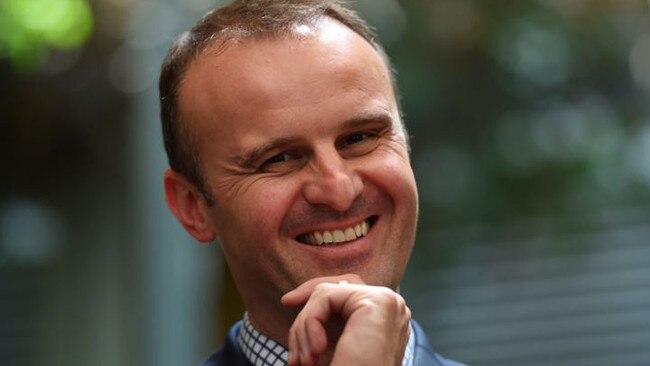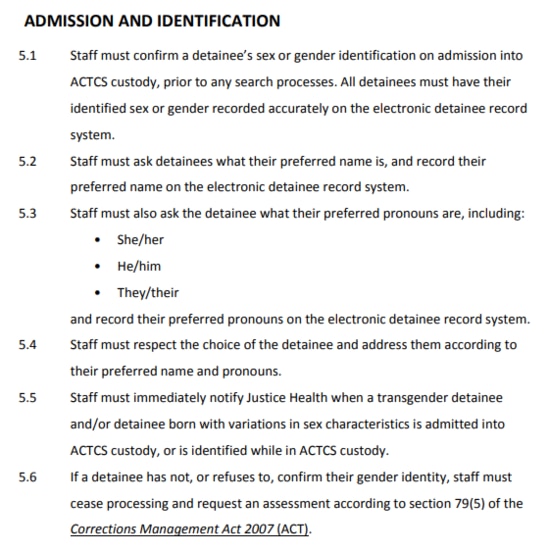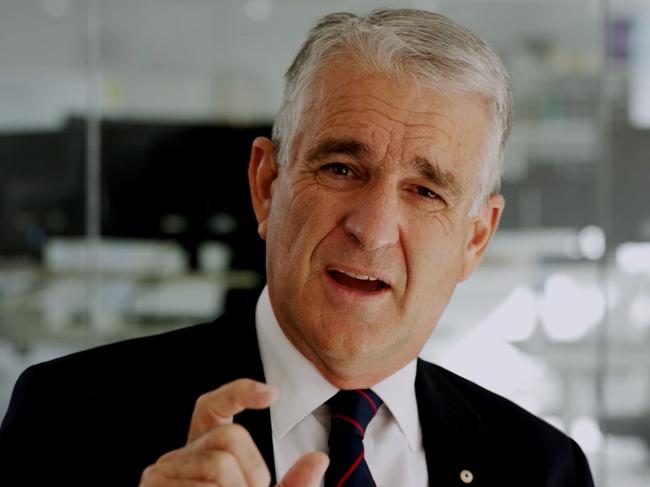Gender identity law passes in ‘rush’
Parents, clinicians, religious leaders or teachers accused of trying to change a child’s ‘gender identity’ risk 12 months in prison.

Parents, mental health practitioners, religious leaders or teachers accused of trying to change the self-declared “gender identity” of children risk 12 months in prison under Australia’s most radical laws to ban so-called “LGBT conversion therapy”.
The ACT government’s chief minister Andrew Barr pushed the law through on Thursday, the last sitting day before he seeks re-election next month, and defied strong criticism from lawyers, medical practitioners concerned about youth gender clinics, Christian schools, the Liberal opposition leader, and the local Catholic archbishop.
Mr Barr, touted as Australia’s first openly gay head of government, insisted the bill only targeted harmful attempts to change sexual orientation or gender identity.
He dismissed as “abject nonsense” any talk of it criminalising robust family discussion of these issues or legitimate therapy for gender dysphoria (feeling “born in the wrong body”).
The chief minister denied the law was aimed at helping under-18s to sidestep parents in order to get invasive transgender medical treatments with risks including sterility, impaired sexual function and lifelong dependence on drugs.
“The aim of the bill is so very clear, it targets practices that are abhorrent, that are outright quackery,” he said.
Mr Barr said he was proud of the longer reach of the new criminal law which can make any adult a defendant, not just health professionals, as is the case with Queensland’s toned-down conversion therapy ban enacted earlier this month.
But former deputy prime minister John Anderson said the haste and lack of proper consultation in the ACT reinforced suspicions about the true purpose of the nationwide anti-conversion therapy political campaign that began in Victoria.
“I’ll walk to Bourke and back if this is really about conversion therapy as the man in the street understands it,” he said.
“Nobody advocates or practises electric shocks for people who are worried about their sexual orientation (any more).
“The big issue at the moment is gender reassignment and confusion in young people.”
The ACT law defines as criminal any attempt to change a child’s self-declared “gender identity”. This does not have to involve coercion.
The law has an escape clause for any adult helping a child to undergo gender change and come out as trans, but there is no such exemption for encouraging children to try to live with atypical gender roles without denying their biological sex or medically refashioning their bodies.
Philip Morris, president of the National Association of Practising Psychiatrists, said: “It’s not clear what (the ACT law says) conversion therapy is, in a situation where the doctor or therapist is exploring the causes of the child’s belief (of being “born in the wrong body”) and treating those causes.
“This legislation basically allows the government to choose just one form of treatment for children with gender dysphoria, when the clinical situation is complex and needs to be considered on a case-by-case basis.”
By contrast, the Royal Australian and New Zealand College of Psychiatrists said the bill had been drafted in a way that eased its concerns about unintended prohibition of legitimate therapy.
"Like the vast majority of the people who’ve written to me, I feel nothing but sympathy towards those with gender dysphoria, and agree with the clinicians and therapists who’ve got in touch who want to see a proper exploration of the factors that lead to it." @jk_rowling 1/3
— Bernard Lane (@Bernard_Lane) August 28, 2020
Under pressure from critics this week, the chief minister put up one amendment which he said would clarify there was no threat to freedom of religious beliefs or teaching.
But critics said the real worry was that an uncertain criminal law would scare away the cautious and compassionate support needed by young people struggling with gender roles or same-sex attraction, leaving open only the path to life-altering gender clinic medical interventions.
Some advocates for the global “gender affirming” model, which is a child-led and rights-driven approach offering hormonal and surgical treatment, frame traditional, non-invasive responses like psychotherapy as “conversion therapy”.
The “affirmative” way is to embrace children’s declared gender identity, with exploration of underlying causes readily attacked as “transphobic” and damaging to mental health.
BBC documentary: Transgender kids, who knows best?
Gender clinics face a rising tide of medical and scientific scrutiny, as well as recrimination from an emerging group of regretful young adult “detransitioners” who reclaim their biological sex and say the gender identity they so recently proclaimed turned out to be a mirage. Many detransitioners online now identify as lesbian. The detransition group on the social media platform Reddit has rapidly grown to 15,600 members.
University of Queensland law dean Patrick Parkinson, speaking in a personal capacity, said the ACT law was “grossly irresponsible” because the government in effect was “determining issues of the medical management of children and young people troubled by gender identity issues”.
“This is not a bill about gay conversion therapy, it is almost entirely about novel and complex transgender issues involving significant controversy with the medical and scientific community.”
ACT Health said it did use gender affirming treatment but with an individualised approach, expert mental health guidance weighing risks and benefits, and informed consent forms based on the “world-leading gender clinic” at Royal Children’s Hospital in Melbourne.
Meaning matters: Malcolm Clark of the LGB Alliance on conversion therapy
Should we ban Conversion Therapy? On the @StephenNolan show I argue it depends what you mean by CT. Some gender activists claim anything but complete affirmation of a young person’s belief they were born in the wrong body is a form of CT. That’s insane.👇https://t.co/qeJSlnKlxj
— Malcolm Clark (@TwisterFilm) August 7, 2020
Canberra activist group A Gender Agenda, which took part in a landmark 2017 Family Court case making it easier and faster for under-18s to start lifelong medication with opposite-sex hormones, helped shape the new ACT law.
This group, with financial links to the Barr government, also endorsed a territory law passed in July allowing young teens to swap the sex on their birth certificate for their gender identity, potentially without their parents’ approval — or even their knowledge, if a tribunal decides the child might be “adversely affected”.
The ACT government, which has an Office for LGBTIQ Affairs with a $2.9m budget for 2017-22, changed the rules not long ago to reinvent prisons on the basis of self-identified gender, with prisoners to be addressed by their preferred pronouns and kept in the unit of their declared gender identity, unless it’s too risky.

Mr Anderson said the ACT government’s policy approach on the eve of an election suggested it did “not want the voters to focus on what’s in (the legislation) and what it might mean”.
He said it seemed that conversion therapy campaigns were “about protecting the people who want to deprive (questioning) parents of involvement in difficult issues around gender confusion.”
The former National Party leader said federal and state attorneys-general should “closely look at what is being snuck in under the cover of an objection to conversion therapy” and make sure parents knew where they stood.
“Otherwise (governments) stand guilty of the charge of creeping statism, and the desire to strip parents of their responsibility and their right — and even their privilege — of raising and socialising their children.”
He suggested federal Health Minister Greg Hunt should reconsider his opposition to an open, national inquiry into the safety and ethics of these medical treatments for sharply rising numbers of troubled teenagers seeking to make irreversible changes to their healthy bodies.
Mr Anderson said the apparent subterfuge of the gender clinic supporters linked to the conversion therapy campaign should prompt the federal government to revisit the case for a public inquiry.
“The ACT legislation, in my view, has belled the cat. What is remarkable about this (nationwide) campaign is its anti-scientific bias and its lack of commitment to objectivity and truth.
“As I understand it, there is an increasing gap between this sort of legislation and the science (raising concerns about the gender clinic medical model), and I think the commonwealth should reconsider (a public inquiry).”

Before the post-2000s explosion in gender clinic caseloads — most patients now are teenage girls, many with mental illness, awkward same-sex attraction, autism and other issues potentially underlying a declared trans identity — the vast majority of the very small number of preschoolers with gender problems grew out of it, and many emerged as young adult gays or bisexuals comfortable with their biological sex.
On Thursday, ACT opposition leader Alistair Coe urged Mr Barr not to rush the bill but to leave it for a parliamentary committee inquiry after the election, so MPs could have expert evidence to guide their votes.
Mr Coe said there was ample time to get it right, because the start date for the new law was not until March, and he objected that the bill had been first seen only 14 days beforehand.
He said parents whose children were suffering difficulties as they grew up needed help, not legal threats. “We cannot support criminalising parents, it’s just not right,” he said.
Mr Barr said everyone had known the legislation was coming “for years”, and he would not delay it on the basis of “outrageous, over the top and hysterical claims” by shadowy organisations beyond the ACT’s borders. The bill passed with Green support.
In June, a Christian education group learned indirectly about half-finished secret consultation on the bill, and was told by Mr Barr’s officials that “standard public consultation” had been abandoned “due to the ongoing impact of COVID-19 on public engagements”.
The government refused to release any submissions or say which groups it included in the consultation.
That was quick! The ACT Government has passed its Sexuality and Gender Identity Conversion Practices bill.
— Equality Australia 🌈 (@EqualityAu) August 27, 2020
The law prohibits conversion practices that occur in a range of contexts whether paid or unpaid, in children and adults. pic.twitter.com/omPVeD6u6F
A lesbian grandmother, “Jules”, who raised her children in the ACT said the first she heard of the legislation was a robocall survey earlier this month from a group critical of the self-identified trans agenda.
She said gay or lesbian conversion therapy had not been practised for “many decades” and neither was there any evidence to support a law locking in gender identity.
“There is not one piece of valid credible medical or psychiatric evidence to support the ‘gender affirmation’ model in children or adults,” she said.
“If health practitioners advise a wait-and-see approach in a particular case, could they be prosecuted?
“What about schools, are teachers at risk of litigation if they do not comply with the gender affirmation model?
“At best, this legislation is meaningless, at worst, it could be unnecessarily litigious for health practitioners, and dangerous for children, teachers and the community.”
A regular Labor voter with medical science qualifications, Jules said she would be voting informal for the first time in the September-October election.
Advocates of LGBT conversion therapy bans say hostility to trans rights is a repeat of past resistance to gay rights but critics, including LGB people turning away from the LGBT establishment, say the new campaign conflates two very different things: sexual orientation and an adolescent’s still developing gender roles.
Trojan Horse: Canadian psychologist and sex researcher Ray Blanchard
Conversion therapy laws are Trojan Horses, ostensibly about banning attempts to change sexual orientation in adults, actually about banning therapy to help gender-dysphoric children and youth become comfortable with their anatomic sex. https://t.co/S2xBAvjW7x
— Ray Blanchard (@BlanchardPhD) February 9, 2020
A Canberra mother of a 16-year-old teenager who identifies as trans — and has mental health problems and refuses to go to school — pointed out the brain did not fully develop until the mid-20s and said children needed “the support, guidance and education from the mature minds of their parents, therapists and carers.
“This bill is eroding the role and responsibility of parents as children and teenagers navigate the most vulnerable years of their lives,” she told The Australian.
“Parents are being targeted by seemingly anonymous influences via social media, influencing children and teenager who may have disconnected from their peers due to underlying mental health issues.”
She said it had been difficult to get any professional help that was not going to push her child down the gender affirming path to lifelong medicalisation, and it took time before Asperger’s syndrome was diagnosed as underlying the gender confusion.
A father who has emerged from a family breakdown in which his trans-identifying step-child with Asperger’s made unsubstantiated allegations of emotional and anti-trans abuse, said conversion therapy bans would further weaponise Family Court conflict.
He said this political campaign was “dangerous because it’s limiting the support that a parent can give to their child — they’ve got the threat of legal action hanging over their head but all they’re trying to do is love their child”.



To join the conversation, please log in. Don't have an account? Register
Join the conversation, you are commenting as Logout